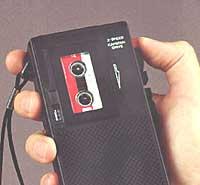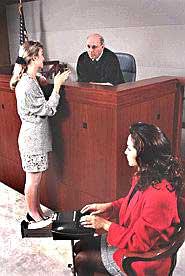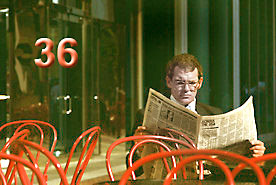Since ignorance of the law is not a valid defense in a court of law, we'll alert you to some danger areas in media work. The bibliography at the bottom of this module will suggest additional sources of information.
In this module we'll touch on three areas: - invasion of privacy
- access restrictions and rights
- libel and slander
In Part II of this topic we'll cover three more issues:
- staging
- copyright
- talent and location releases
Privacy--Public and
Private Individuals
Although the U.S. Constitution does not talk about a right of privacy or invasion of privacy, throughout the years courts have held that citizens need protection from the unwarranted or unjustified publication of images or information of a private nature.
When it comes to invasion of privacy, the law makes a distinction between private and public individuals. Once individuals enter the "public spotlight" (either intentionally or through accidental circumstances), they are afforded much less legal protection. We only need look at the tabloids to see this. At first it might seem that everyone should be afforded full protection from the public disclosure of private information. But, a problem arises when that "private" information relates to illegal or immoral conduct that could affect a significant segment of the public. For example, - If a man is convicted of child molesting, can he claim it's private information? If so, does he have a right to keep the press from disclosing that information (and the
 people in the neighborhood where he lives from knowing about it)? people in the neighborhood where he lives from knowing about it)?
- If a politician is found guilty of sealing money from the public treasury, do we have a right to know it (especially before the next election)?
- If a respected and married evangelist who regularly preaches against illicit sex has sexual affairs, can he claim that this information is private and should not be publicly disclosed?
In these cases, many people feel that not only does the public have a right to know these things, but that in a democratic society they must know them in order to make informed choices. Thus, the responsibility of a free press is to bring such things to the public's attention.
Recognizing the crucial role that a free press has in maintaining a democratic system, U.S. courts have generally been quick to protect the news media's rights to gather and disseminate information--as long as the information is true. But, what if that information is true but voyeuristic in nature and intended primarily to generate ratings or the increased sales of a publication? It has come as a surprise to many journalists that disclosing true and verifiable facts about someone can be an invasion of privacy. To be so, the information must: - consist of information of a private nature that is deemed offensive to a reasonable person
- consist of information that's not deemed newsworthy or of legitimate concern to the public
- be published, broadcast, or in some way disseminated to an audience
Disclosing
that a private individual has AIDS, is a lesbian, or a homosexual,
may fall into this  category,
if such facts are not deemed relevant to any currently newsworthy
story. category,
if such facts are not deemed relevant to any currently newsworthy
story.
Individuals have successfully sued news organizations when the organization disclosed information about mental retardation, plastic surgery, and in vitro fertilization--information that a jury subsequently decided (in the specific circumstances involved) should have been kept private. Juries seem to be swayed by three factors in this regard: 1. How sympathetic they are to the particular plaintiff. Children and older people top that list; public figures rank near the bottom
2. How extensive the intrusion is. Video ranks first; audio further down the list; and a narrative, especially if it doesn't specifically refer to the plaintiff, ranks at the bottom
3. How the reporter got the information. Juries tend to frown on reporters who were clearly trying to "dig up dirt," especially if they used questionable or illegal means to obtain the information.
All this assumes that the individual didn't freely disclose the information. If that's the case, or if the information could easily be obtained from public records, courts have not seen the disclosure of this information as being an invasion of privacy.
Intrusion
One type of invasion of privacy is intrusion, also referred to as intrusion on seclusion, or intrusion on solitude. For private (as opposed to public) individuals, overhearing and publicizing private conversations, or broadcasting images taken on private property typically constitutes an invasion of privacy. A general guideline is that if you are on public property when you obtain the information or images, and you do not use a long telephoto lens or a highly directional microphone, an invasion of privacy case would be hard to prove. This is because an average citizen could have easily witnessed the same thing. Things change, however, when you trespass onto private property or use some type of sophisticated surveillance equipment.
Reporters
often tape in-person interviews and  telephone conversations. Although asking permission to tape an in-person
interview may intimidate a few people, it allows the reporter to check
quotes for accuracy. It's cheap insurance in case the person later claims
that he or she was misquoted.
telephone conversations. Although asking permission to tape an in-person
interview may intimidate a few people, it allows the reporter to check
quotes for accuracy. It's cheap insurance in case the person later claims
that he or she was misquoted.
Taping telephone conversations can, of course, be done surreptitiously. This can be a problem. Although federal law stipulates that only one party--which would generally be you--need to know that the conversation is being taped, some states require that both parties know.
Access
One of the grayest areas of the law and one that is most often encountered by news people is access to locations. If the location is on public property, there's generally never a problem, unless you're seen as interfering with police or public safety officials. Thus, photographing a public demonstration, disaster, or even a crime scene under these conditions should be okay. This does not mean that someone won't object or try to stop you, even though they don't have the legal authority to do so. Sometimes people, including the police, don't want something publicized. There have even been arrests in some situations. Even though the charges generally can't be sustained, and those authorities risk a false arrest charge, the arrest effectively stops the reporter from covering the event. Thus, in these rare cases, the intended result is achieved.
For
example, during the Vietnam War some 7,000 war protesters
were arrested on one day in Washington D.C., the largest
number of people
ever arrested
in a single day in the United States. (One of my students
at the time called to say that he wouldn't make it to class
because he was in jail!) The court later ruled that these
young people were engaged in a perfectly legal protest,
and everyone was released from jail.
Even
so, President Nixon wanted to "send a message" to protesters
that opposing his policies was (in his mind) anti-American.
He also didn't want the many protesters to appear on the
evening news, where they could further turn public
opinion against the war. Although he
tried to link the protests with Communism, no link was
ever found. (Nixon would later be forced to resign from
office after it was found that he had engaged in numerous
illegal
activities.)
The
war protests took place on public property. However, once
you move to private property, you need permission,
either
from the owner of the property or his agent (who might
be renting the property), or from police.
Court decisions have generally held that, in the final analysis, the press (with or without a press pass) has no legal privileges beyond those granted to the general public. At the same time, public officials often grant recognized members of the press special privileges. Some cities issue "press credentials" for working members of the press. News people often decide to go onto private property in the pursuit of information or pictures--until they are specifically asked to leave. Interestingly, courts have held that videographers will generally be allowed to broadcast any footage taken before they were asked to leave.
 Sometimes
the story is worth the risk of being arrested, and under certain circumstances
courts have held that the ends (getting a story that would be impossible
otherwise) justified the means (trespassing on private property). Sometimes
the story is worth the risk of being arrested, and under certain circumstances
courts have held that the ends (getting a story that would be impossible
otherwise) justified the means (trespassing on private property).
It had always been assumed that if a law enforcement official that has taken charge of a crime scene grants you permission to go onto private property, a trespassing case won't hold up.
A recent court case is the one exception here. In some rather unusual circumstances, a judge upheld a trespassing case against a network ENG crew,
even after a FBI agent had specifically invited them to accompany them into an apartment during a drug bust.
Guidelines for Intrusion
To conclude, let's look at some summary points (questions) that courts have deemed relevant in intrusion cases. - Was what you heard or photographed also accessible to the average person standing on public property?
- Were you given permission to enter private property?
- Did you break the law when you could have gotten the information in a legal way?
- Was the information you got in the disputed circumstances newsworthy and of legitimate concern to the public?
- Was "prying" involved? (Prying goes beyond basic curiosity and moves into the area of offensive and inappropriate snooping into a private individual's personal life.)
- Is what you disclosed something that is generally agreed to be of a private nature?
- Would your alleged intrusion be deemed objectionable to a reasonable person?
Commercial Appropriation Commercial
appropriation (also know as misappropriation) involves an unauthorized use of an individual's or organization's prominence in order to benefit someone else.
The courts have recognized that well-known people acquire an identity that is of value, and these people deserve to be protected from someone "cashing in" on that value without their consent. Let's say you are doing a commercial for a restaurant or a health spa and you just happen to catch some well-known person in attendance. Obviously, the commercial would be much more influential if this person appeared to frequent this establishment. However, if you run the commercial without their permission, they could sue you. Celebrities have sued and won damages in such cases. If you were televising a public event and wanted to show general shots of the audience in attendance, there would be no problem, even if one of the members of the audience was well known. Individuals in this case are considered "background." But, if one of the people in the audience was a well-known person and you appeared to go out of your way to bring this fact to the attention of the audience, you could be guilty of trying to "cash in on" the person's prominence. At the same time, stations and networks know that few prominent people sue in these circumstances; and, in fact, many appreciate the publicity. If the public figure is officially participating in an event being covered, he or she can be considered a part of the event. In such cases the camera shots may dwell on the person as much as they wish.
Shield Laws
About half the states have shield
laws to keep courts or judges from forcing news people to reveal confidential sources of information.
A well-known investigative reporter, who is responsible for breaking many stories about corruption and wrongdoing in high places, noted that without the assurance that news people can protect the confidentiality of their sources, few people would be willing to risk their own welfare and "name names" in revealing inside information about crime and corruption. In states where there are no shield laws, some reporters have chosen to serve time in jail on contempt of court charges rather than break a promise to keep a source's name confidential.
Revealing
that person's name might easily endanger that person's life
or welfare, not to mention stopping people from revealing information
to the reporter again. But, there is also another side to this.
Legally, people are allowed to "face their accuser."
At the same time, no responsible news medium would run a story based on a single confidential source. The original source should only serve to launch an investigation. Reputable news organizations always verify details of important stories through independent sources. This not only protects the credibility of the news organization, but can save a costly defamation lawsuit.
Defamation
Defamation is defined as the communication to a third party of false and injurious ideas that tend to lower the community's estimation of the person, expose the person to contempt or ridicule, or injure them in their personal, professional, or financial dealings.
Libel is
defamation by written or printed word and is generally considered more
serious than slander,
which is defamation by  spoken
words or gestures. Some recent court decisions, however, have removed
much of the distinction between the two. spoken
words or gestures. Some recent court decisions, however, have removed
much of the distinction between the two.
Local stations and networks have been sued for millions--even billions of dollars. In 1990, the median jury award against a news organization was $550,000. Only six years later this figure had risen to $2.3 million. Since even the cost of defending a libel or slander suit is often several hundred-thousand dollars, many stations and production agencies have insurance against libel and slander. The injured person in defamation cases must be apparent to the audience, although not necessarily specifically named. The false statement must have been presented (or interpreted by an average reader/viewer) as fact, and not clearly intended as satire or fair comment. Although negligence on the part of the journalist must generally be shown in these cases, so-called "honest mistakes" can also precipitate a legal action, if it can be demonstrated that a false statement injured someone's good name, professional standing, or resulted in financial loss. Negligence can range all the way from not taking the time to check facts or proofread copy before it was aired to a careless disregard for the truth. Actual malice, which ranges from a careless disregard for the truth to an intent to cause injury, is the most serious form of defamation and typically results in much greater damages. The injured party in a defamation suit doesn't have to be a person; it can be a company or institution. If you state that "all X-brand cars are lemons," or that a particular company produces food that will make you sick or kill you, you can expect to get a very official call from their lawyer. Instead of saying that all X-brand are lemons, you would be on much safer ground by stating something that you could prove, such as "68% of all X-brand cars are in for repair within 30 days of their purchase." In the case of the food, you could cite hospital records that indicate that 124 people in Peoria, Illinois were admitted to area hospitals after eating Miss Mollie Maple's Muffins. But in both cases you want to make very certain that you can prove the accuracy of the statements.
Confronting Lawsuits
It should be obvious that people in the media must carefully check any questionable material before publication or broadcast. At one TV station, questionable segments are viewed by the executive producer, the news director and the station's attorneys before broadcast. If you are served a subpoena for alleged defamation, don't try to start explaining your way out of it. You can get yourself in deeper trouble. Also, never agree to hand over a videotape or transcript of the segment in question unless ordered to by the court. Immediately turn the matter over to an attorney who specializes in this area. And never make a comment about the circumstances
surrounding a challenged statement to anyone except your lawyer. If a reporter says, "I'm really sorry, I was in a hurry and I guess I just didn't check my facts," this could constitute an admission of guilt--even a "reckless disregard for the truth," which could constitute malice. Cases have been lost after such admissions.
Corrective Statements
If a definite error in fact is discovered after it has been published or broadcast, you may be able to reduce damages by immediately issuing a full corrective statement with an apology. Although this may not eliminate a lawsuit, it may serve to reduce the damages awarded.
In the next module we'll continue with part two of Media Legal and Ethical Issues. | 
 How costly? Well, the average cost of defending yourself from a libel suit (which could result from the last statement) is about $550,000. If you happen to lose the suit, the settlement could amount to millions of dollars on top of that.
How costly? Well, the average cost of defending yourself from a libel suit (which could result from the last statement) is about $550,000. If you happen to lose the suit, the settlement could amount to millions of dollars on top of that. people in the neighborhood where he lives from knowing about it)?
people in the neighborhood where he lives from knowing about it)? category,
if such facts are not deemed relevant to any currently newsworthy
story.
category,
if such facts are not deemed relevant to any currently newsworthy
story. telephone conversations. Although asking permission to tape an in-person
interview may intimidate a few people, it allows the reporter to check
quotes for accuracy. It's cheap insurance in case the person later claims
that he or she was misquoted.
telephone conversations. Although asking permission to tape an in-person
interview may intimidate a few people, it allows the reporter to check
quotes for accuracy. It's cheap insurance in case the person later claims
that he or she was misquoted. Sometimes
the story is worth the risk of being arrested, and under certain circumstances
courts have held that the ends (getting a story that would be impossible
otherwise) justified the means (trespassing on private property).
Sometimes
the story is worth the risk of being arrested, and under certain circumstances
courts have held that the ends (getting a story that would be impossible
otherwise) justified the means (trespassing on private property). spoken
words or gestures. Some recent court decisions, however, have removed
much of the distinction between the two.
spoken
words or gestures. Some recent court decisions, however, have removed
much of the distinction between the two.